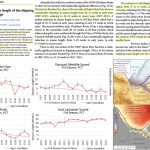
By Kenneth Richard on 18. July 2024
Global warming was supposed to open up Arctic region shipping routes, making the Northwest Passage easier and less risky to traverse. Per a new study, the opposite has happened. As we reported earlier this year, while a declining trend in Arctic sea ice was observed from the 1990s to 2007, there has been no trend […]
Posted in Arctic, Sea Ice |
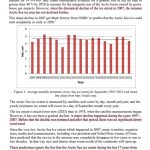
By Kenneth Richard on 8. January 2024
“[S]ince the dramatical decline of the ice extent in 2007, the summer Arctic sea ice area has not declined further.” – Astrup Jensen, 2023 Scientists have been using the year 2007 as the starting point for assessing Arctic sea ice trends for nearly a decade. A 2015 study published in Nature Climate Change reported a “near-zero […]
Posted in Arctic, Sea Ice |
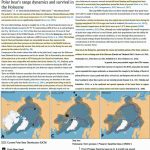
By Kenneth Richard on 1. January 2024
Arctic regions with 6+ months of sea ice coverage today were ice-free nearly year-round 9,000 to 5,000 years ago (2°C warmer) and 130,000 to 115,000 years ago (7-8°C warmer). And yet polar bears survived these periods. Per a new study, today’s Scandinavian Arctic climate is so cold it is actually “comparable” to that of the […]
Posted in Arctic, Paleo-climatology, Sea Ice |
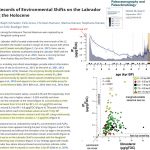
By Kenneth Richard on 20. November 2023
Millennial-scale Arctic sea ice reconstructions do not corroborate alarmist claims of unprecedented sea ice losses in modern times. Using sea ice biomarker proxy (IP25), scientists (Kolling et al., 2023) have determined that the sea ice extent in the Labrador Sea was nearly absent throughout the year (close to 0.0 μg/gTOC) for much of the last […]
Posted in Arctic, Paleo-climatology, Sea Ice |
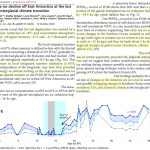
By Kenneth Richard on 16. November 2023
The timing of the dramatic Antarctic sea ice decline during the last deglaciation suggests solar forcing and sea ice retreat “instigated” century-scale climate warming and atmospheric CO2 change. This would appear to challenge the perception CO2 plays a causal role in glacial-interglacial sea ice and climate changes. From ~21,000 to 19,500 years ago, when CO2 […]
Posted in Antarctic, Paleo-climatology, Sea Ice |
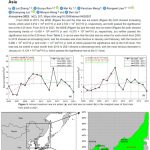
By Kenneth Richard on 13. November 2023
Yet another region of the world fails to cooperate with “global” warming instructions. New research (Zhang et al., 2023) finds the sea ice extent has undergone an overall increasing trend from 2005-2021 in the Sea of Japan, Yellow Sea, and Bohai Sea. “Over the past 17 years, the maximum sea ice extent in the marginal […]
Posted in Cooling/Temperature, Paleo-climatology, Sea Ice
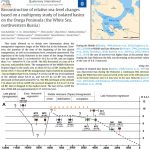
By Kenneth Richard on 26. June 2023
The belief that modern sea levels and sea level change rates are unprecedentedly high takes another hit. Per a new study, sea levels were ~9.5 m higher than today about 8000 years ago (White Sea, northwestern Russia), then fell to ~7 m higher than today by around 4000 years ago. From that point in the […]
Posted in Paleo-climatology, Sea Ice, Sea Levels |
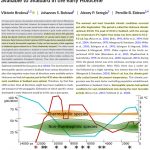
By Kenneth Richard on 6. April 2023
Back in the Early Holocene, when CO2 levels were said to be ~255 ppm, Arctic Svalbard was warm enough to accommodate abundant numbers of thermophiles, or warmth-demanding species. Only “remnants” of these species and their habitat exist in today’s much-colder Arctic. With the exception of a few centuries in recent millennia, today’s Svalbard (Arctic) is […]
Posted in Arctic, Paleo-climatology, Sea Ice |
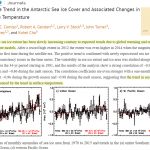
By Kenneth Richard on 21. March 2023
The observed incapacity for southern elephant seals (SES) to withstand late 20th and early 21st century extreme cold and expanding sea ice conditions suggest coastal Antarctica (Victoria Land Coast, VLC) climate is colder and icier today than any time since the last glacial. A new study even suggests the last glacial (CO2 ~190 ppm) may […]
Posted in Antarctic, Cooling/Temperature, Sea Ice |
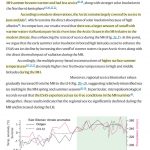
By Kenneth Richard on 29. December 2022
“Compared to the present climate, the Arctic climate in MH [Mid-Holocene] summer became warmer and had less sea ice” (Dong et al., 2022). While the modern Arctic “remains largely covered by sea ice in June and July,” the higher summer sea surface temperatures (SSTs) from about 3,000 to 7,000 years ago meant the East Siberian […]
Posted in Arctic, Paleo-climatology, Sea Ice |
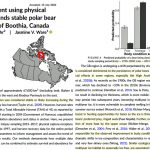
By Kenneth Richard on 1. December 2022
Polar bear populations are stable to increasing with improved body condition in the 21st century. The alarmist narrative that says polar bears are threatened by sea ice losses is strongly at odds with real-world observations. A new study assesses the body condition of polar bears in the Gulf of Boothia – an immense 67,000 km² […]
Posted in Alarmism, Arctic, Sea Ice |
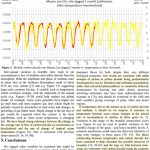
By Kenneth Richard on 7. November 2022
Annual carbon dioxide (CO2) and methane (CH4) change rates lag behind changes in sea ice extent by 7 months and 5 months, respectively. This robust correlation is consistent with the conclusion that CO2 (and CH4) changes are responsive to temperature, not the other way around. It is commonly believed that the annual “squiggle” of the […]
Posted in CO2 and GHG, Sea Ice |

















Recent Comments